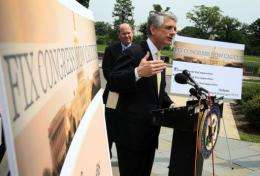Virginia Congress races aim to cross digital divide

Congressman Scott Rigell faces the tightest re-election battle in all of Virginia, so while he steps up his campaign ground game, the lawmaker is turning to what helped get him elected in the first place: social media.
Barely an hour after Rigell attended his first debate against his Democratic opponent Paul Hirschbiel on Friday night, his Facebook page and Twitter feed featured photographs and commentary about the showdown.
Rigell is known to wake up early and send tweets. He himself often posts messages to his 13,000 Facebook supporters—more than any Virginia congressman other than House Majority Leader Eric Cantor—seeking their comment on issues of the day.
Hirschbiel's Facebook page showed a post-debate picture too, although it was put up mid-morning Saturday. He hadn't sent a tweet since Tuesday.
"New media is like a large wave. You can either get pummeled by it, or get your longboard out and ride it," Rigell told AFP in between his appearances at a district parade and a run for breast cancer awareness barely three weeks before the November 6 election.
"This is a force and influence that is not going to diminish over time."
Rigell is a freshman Republican in the US House of Representatives but is already among its most savvy users of life's digital dimensions that have become so commonplace for younger—and many middle-aged—voters.
That's thanks to his embrace of the Web in his successful 2010 campaign against an incumbent who critics said had a flat-footed social media approach.
This year, both Rigell and Hirschbiel are blanketing their district with TV ads, many of which have turned negative.
And they are banking on turnout for US ballot-toppers President Barack Obama and Republican challenger Mitt Romney, both of whom have campaigned multiple times in the battleground state of Virginia, to help get elected.
But in the home stretch of this year's campaign, according to Rigell senior staffer Jason Miyares, the Internet ground game has been critical.
"It's the way to motivate and activate your core base, to get them to make calls for you, go door to door for you, blog for you," as well as steer potential supporters to donate, he said.
There is no doubt Rigell must kiss the babies, shake thousands of hands, give hundreds of stump speeches, and be the ever-present candidate if he wants to win re-election in a tight race.
But politicians across the spectrum have realized that ignoring social media is courting disaster.
"In this day and age, you have to put a digital-first philosophy on everything that you're doing," Zac Moffatt, digital director of the Romney campaign, told AFP.
"The rise of digital: is it the only differential? No," Moffatt said. "But are elections won at the margins? Yes, and I think that's where digital is now, a differentiator."
At first glance, Hirschbiel appears outmatched on the social media front. He engages supporters and volunteers on Facebook, but he has just 223 Twitter followers, compared to 5,609 for Rigell.
"I am baffled, stunned that our opponent hasn't tried to be more competitive with new media," Miyares said.
In the Washington suburb of Alexandria in northern Virginia, Republican Chris Perkins has an uphill battle against incumbent Gerry Connolly, who leads handily in local polls.
"We are blessed to have a greater online presence these days," Perkins, a retired US Army Special Forces officer known on his website as "the Colonel," told a business forum at the Mount Vernon Country Club.
But no single medium is enough, he said.
"It's also equally important to get out there and actually talk to the people face to face like the opportunity I have today, and let them know that I'm a real person."
Perkins recalled recently addressing a group of 60 retirees, and asking how many of them were on Facebook. Only three raised their hands.
Northern Virginia is one of the country's top high-tech corridors; some have dubbed it Silicon Valley East, and military research agency DARPA, which helped invent the Internet, is here. Nearly everyone carries a smartphone.
But social media, said Connolly staffer George Burke, is just "one more asset" in a trunk full of campaign tools.
"Even with a highly educated, wired constituency like ours, we still do the mail, we still do the television, we still do the personal appearances," he said.
(c) 2012 AFP


















